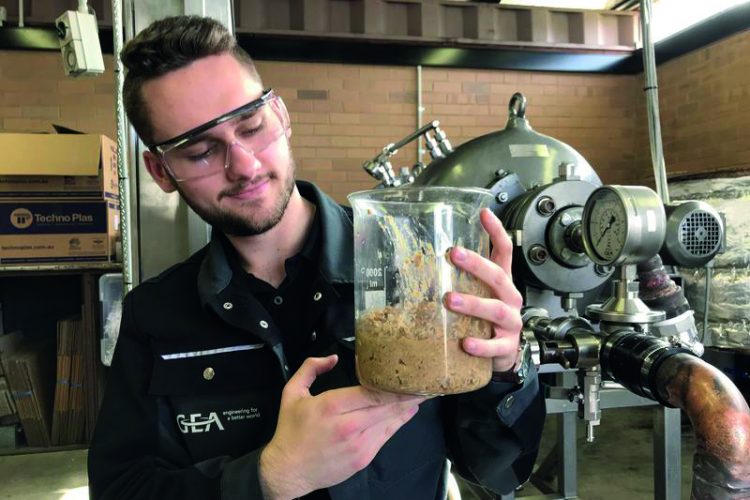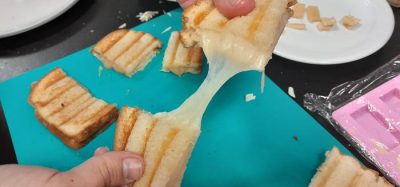GEA explores potential of insect protein for animal feed
- Like
- Digg
- Del
- Tumblr
- VKontakte
- Buffer
- Love This
- Odnoklassniki
- Meneame
- Blogger
- Amazon
- Yahoo Mail
- Gmail
- AOL
- Newsvine
- HackerNews
- Evernote
- MySpace
- Mail.ru
- Viadeo
- Line
- Comments
- Yummly
- SMS
- Viber
- Telegram
- Subscribe
- Skype
- Facebook Messenger
- Kakao
- LiveJournal
- Yammer
- Edgar
- Fintel
- Mix
- Instapaper
- Copy Link
Posted: 4 August 2020 | GEA | No comments yet
As a more environmentally friendly alternative to existing production processes for food supplies for animals, GEA has been working with an Australian start-up to explore the potential of sustainable protein for animal feed.


Insects, black soldier fly larvae specifically, appear to hold the key.
Since 2017, GEA has been supporting Future Green Solutions in carrying out research on processing black soldier larvae into nutritional animal feed by providing them with expertise, and a separating decanter. The Australian start-up believes the insect alternative to soy and fish protein and grains, could offer customers a sustainable long-term solution.
Traditionally, for the fish farming industry, animal feed manufacturers have focused on fish meal made from fish not used for human consumption, while for the livestock industry grains like corn are the main source of feed. However, as a result of caps on fishing, an unpredictable climate that is putting pressure on the supply and cost of grains and the demands of consumers, they are being forced to explore more sustainable sources.
According to Luke Wheat, CEO, Future Green Solutions, this is where protein rich insects like the black soldier fly, which have the potential to reduce carbon dioxide emissions and can be grown in small spaces, come in:
“We take farm waste and use the black soldier fly larvae to digest it. The insects are then processed into animal feed and what is left is used as a fertilizer. We’re adding value to waste and then putting it back into the food stream as high value protein. The insects are produced in a controlled and methodical way that’s not affected by changes in the climate.”
Proven GEA technology enhances research
As part of the collaboration with Future Green Solutions, GEA supplied a three-phase separating decanter, which Dirk Sindermann, Head of Process Technology Renewables, Business Unit Separation, Separation and Flow Technologies, describes as the heart of the processing line:
“The decanter is responsible for separating the protein in the insects from the fat, which is one of the most important steps.”
The decanter, along with the expertise provided by the Sales Support, Renewables & Process Technology Renewables teams in Oelde, Germany, as well as colleagues from GEA Australia, has allowed Future Green Solutions to go from a start-up conducting research to getting closer to the commercialization phase. The decanter allows the company to produce a product that is low in fat and high in protein, making it much more valuable within the market.
High potential industry
For GEA, the collaboration is an opportunity to get a foot in the door in an industry which Dirk Sindermann describes as having big potential:
“The insect for protein industry is still very young and start-ups in particular are experimenting with different methods for the best possible production of proteins from insects. Through this collaboration, we can collect important data and gain experience.”
In the future, the production of insect proteins will take place on a large scale and due to our extensive and longtime expertise in recovering proteins from all kinds of sources – vegetable or animal based – GEA is the perfect partner for this growing industry.”
–Dirk Sindermann, Head of Process Technology Renewables at GEA
Currently, Future Green Solutions continues to conduct trials and increase its production. However, the company aims to open its first commercial facility within two years and is in talks about an agreement with a buyer that would keep several facilities running.
Why Australia?
The legislation around both the processing of insects for the food industry and the animal feed industry differs around the globe. GEA chose to partner with an Australian company because the country has more flexibility when it comes to feeding the insects farm waste or waste from canteens.
“Right now you cannot take the same approach in Europe, it’s much more limited because of the legal framework. However, the Australian government has given Future Green Solutions a number of grants and is interested in pushing this type of development,” says Dirk Sindermann.
For Luke Wheat, when looking to the future, he says GEA’s involvement continues to be invaluable:
We spent a lot of time on research and development of our process. But the key to moving forward has been GEA’s separating decanter. My experience with GEA and GEA’s people in Germany and here in Australia has been nothing but a pleasure. GEA understands the vision of where the insect industry is moving to and can see that it’s a huge business opportunity.”
–Luke Wheat, CEO, Future Green Solutions
Related topics
Ingredients, Insect Protein, Proteins & alternative proteins








